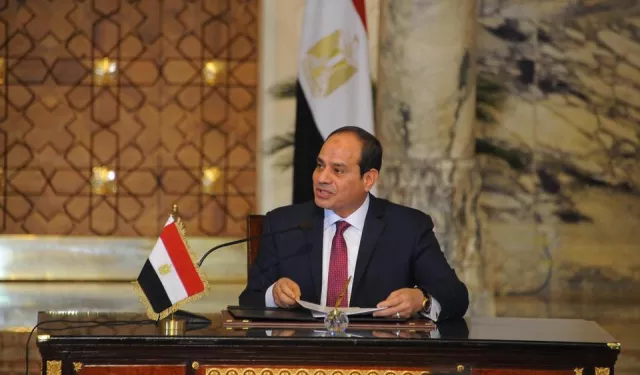Egypt's President Abdel Fattah El-Sisi described the humanitarian crisis in Gaza as a “systematic war of starvation and genocide,” reiterating his condemnation of Israel’s military campaign in Gaza and the international community’s inaction.
During a press conference at Cairo’s Presidential Palace, speaking alongside visiting Vietnamese President Luong Cuong on Tuesday, El-Sisi warned that history will hold accountable those who failed to respond.
He further asserted that Egypt would never allow itself to become a conduit for the forced displacement of Palestinians, pushing back against accusations that Egypt was complicit in a blockade that led to widespread international condemnation and accusations of collective punishment and war crimes.
“We are ready to bring in humanitarian aid at any time,” El-Sisi said.
“However, we are not prepared to accept or resettle Palestinians on our land. There are those who aim to deflect attention from the perpetrator of this tragedy. I caution again, as I have before, against the continuation of this situation,” he added.
Back in January, the Trump administration proposed that Egypt and Jordan host Palestinians displaced from Gaza. The idea was swiftly rejected by the Arab states and condemned by human rights groups as a form of ethnic cleansing.
During today's press conference, El-Sisi noted that of the five crossings connecting Gaza to the outside world, only the Rafah crossing is under Egyptian administration, with the remaining access points controlled by Israel.
“Egypt has not ceased its efforts to send humanitarian relief into Gaza,” he said, adding that more than 5,000 trucks carrying aid were currently waiting inside Egyptian territory, ready for entry.
“Before the war, between 600 and 700 trucks entered Gaza daily from Egypt, supplying 2.3 million Palestinians with essential food and supplies. Imagine reducing that number to nearly zero over the past 21 months,” he said.
“The suffering you’re seeing now in the Strip is the result of that. Not because Egypt stopped sending aid or participated in a siege,” he added.
He continued, “The Egyptian people, and the world, should know that these accusations against Egypt are hollow. We are prepared to send multiple times more aid to relieve the Palestinian people. We have called for a ceasefire repeatedly, and we are doing everything in our power — and we will keep doing so.”
The president’s remarks followed recent attacks on Egypt and Jordan by senior Hamas official Khalil Al-Hayya’s. In a fiery speech last month, he described the Rafah crossing as a “gateway to death and starvation” and urged Egyptians to pressure their government.
He also appealed to Jordanians to resist Israeli plans for Al-Aqsa Mosque and reject what he called efforts to create an “alternative homeland” for Palestinians.
Hamas leader in Gaza, Khalil al-Hayya, also issued a provocative appeal, urging people to march on Israel “by land and sea” and to surround Egyptian embassies in protest. Addressing Egyptians directly, he asked: “How can you allow your brothers to die at your borders?”
Al-Hayya's remarks isn't the only recent attack on Egypt. Over the past weeks, Egyptian diplomatic missions abroad have faced protests and attempts to blockade them, with demonstrators demanding Cairo open the Rafah crossing and speed up the delivery of aid.
The Egyptian government has consistently maintained that the Rafah crossing remains open from its side, though Israel has exercised control over the Palestinian side since May 7, effectively blocking the flow of aid.
Of all the protests, one of the most prominent was organized outside the Egyptian embassy in Tel Aviv by a group aligned with Islamist political factions.
The Egyptian Journalists Syndicate swiftly condemned the demonstration, accusing organizers of seeking permits from “Zionist killing authorities” and calling the protest “a betrayal of the martyrs’ blood.”
